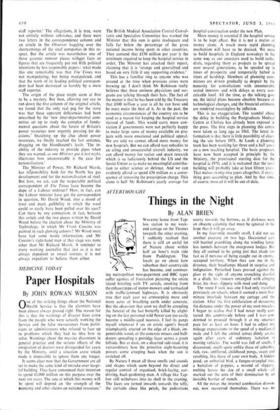MEDICINE TODAY
Paper Hospitals
By JOHN ROWAN WILSON
ONE of the striking things about the National Health Service is that the alarmists have been almost always proved right. The reason for this is that the warnings of disaster have come from the people who were actually working the Service and the false reassurances from politi- cians or administrators who refused to face up to problems which they had no idea how to solve. Warnings about the massive discontent in general practice and the serious effects of the emigration of doctors were disregarded for years by the Ministry, until a situation arose which made it impossible to ignore them any longer.
It seems clear now that the Government are all set to make the same kind of mistake over hospi- tal building. They have announced their intention to spend £1,000 million on this purpose over the next ten years. The rate at which this money will be. spent will depend on 'the strength of the economy and other claims on national resources.'
The British Medical Association Central Consul- tants and Specialists Committee has warned the Minister that this sum is quite inadequate and falls far below the percentage of the gross national income being spent in other countries. They contend that £150 million per year is the minimum required to keep the hospital service in order. The Minister has attacked their report, claiming that it is 'strange and generalised and based on very little if any supporting evidence.'
This has a familiar ring to anyone who was around at the time when previous crises were brewing up. I don't think Mr Robinson really believes that these eminent physicians and sur- geons are talking through their hats. The fact of the matter is that he has been told by the Treasury that £100 million a year is all he can have and he must make the best of it. As in the past, the economic circumstances of the country are to be used as a reason for keeping the hospital service starved of funds. This would carry more con- viction if governments were not perfectly happy to make large sums of money available on pro- jects with more emotional and political appeal. We are told we cannot afford more money for new hospitals. But we can afford vast subsidies to an ailing and unsuccessful aircraft industry, we can afford money for rocket and space research which is so ludicrously behind the US and the Soviet Union as to make no meaningful contribu- tion to either science or defence. And we can evidently afford to spend £50 million as a conse- quence of removing the prescription charge. This alone is half Mr Robinson's yearly average for hospital construction under the new Plan.
More money is essential if the hospital service is to be kept afloat. But it is not a matter of money alone. A much more rapid planning mechanism will have to be devised. We seem to build hospitals in England nowadays in the same way as our ancestors used to build cathe- drals, regarding them as projects to be spread over several generations, to be speeded up in times of prosperity and temporarily halted in times of hardship. Members of planning com- mittees are driven gradually to despair by the necessity for consultations with innumerable vested interests and with delays at every con- ceivable level. All the time, as the talking goes on, the initial plans become obsolete because of technological changes, and the financial estimates are rendered meaningless by inflation.
This is no exaggeration. The scandal about the delay in building the Postgraduate Medical Centre at Chelsea has already been exposed in the press. The first steps in planning this centre were taken as long ago as 1961. The latest in- formation is that there is little possibility of clear- ing the site before 1971. At Leeds a planning team has been working for three and a half yea i s on a new teaching hospital. The basic proposals have now heed accepted in principle by the Ministry, the provisional starting date for the hospital is 1970, and it is reckoned that the total building will probably take at least fifteen years. That makes twenty-two years altogether, if every- thing goes according to plan. And by that time, of course, most of it will be out of date.


































 Previous page
Previous page